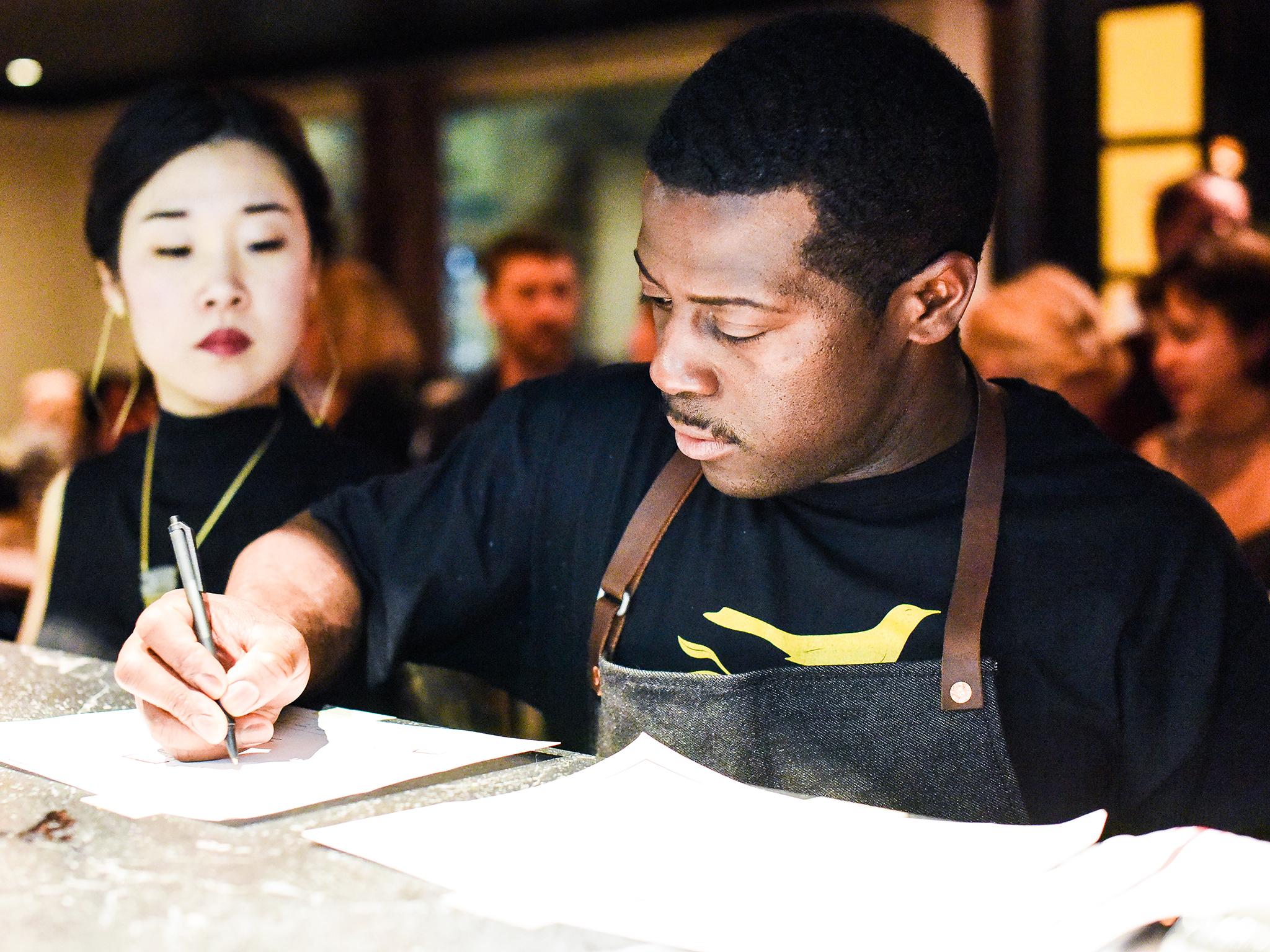A is for Africa: Southern restaurant tackles racism in food with an encyclopedic menu
Chef Eduoardo Jordan is on a mission to educate diners about the origins of Southern American food

“There are common misconceptions of Southern American food in that it is viewed as less elevated than other cuisines or that it is unhealthy,” says Seattle-based chef Eduoardo Jordan of dishes including chitterlings (pig intestines cooked with aromatic spices) or collard greens (brassica leaves cooked with smoked meat, chili and sugar). That is why his new restaurant Junebaby not only comes with a conventional dinner menu, but an encyclopedia.
“In reality,” he continues, “Southern food is what shaped American culinary history. Enslaved people were given the undesirable parts of meat and they used it the best they could to recreate dishes from back home. Items like fried chicken or hoecakes were consumed to fuel the hard laborious work they were forced to perform. There is a deep rooted history to southern cuisine and it has yet to be fully understood.” This idea hits back at racist attitudes towards Southern food that are used to stereotype African Americans at a time when racial tensions in the US are at a boiling point.
Junebaby's encyclopaedia, that has been published online ahead of the restaurant's launch this month, is trying to help build a new level understanding. Eventually Jordan hopes to link this to an interactive dinner menu for guests to explore as they choose what to eat.
As a well-respected chef, Jordan is well-equipped to change attitudes towards Southern food. Born in St Petersburg, Florida, he spent time at restaurants including The French Laundry and Lincoln Ristorane in New York, Bar Sajor and Sitka & Spruce in Seattle. He opened his first and award-winning restaurant, Salare, in June 2015. There, he has made a name for himself with foods piecing together influences from France, Italy, the Caribbean, and the American South to great acclaim. For Junebaby, he is stripping the menu back to focus on Southern cuisine. This is an approach that plays in neatly with the encyclopaedia, where words fraught with meaning and complexity are considered from their origins.
The first entry is Africa, which is described as the: “World’s second largest and second most populous continent. Paleo-anthropologists consider Africa to be the oldest inhabited territory on Earth, with human species originating from the continent. Africa has a long history of slavery beginning with the Arab slave trade between the 7th and 20th centuries. Between the 15th and 19th centuries, the Atlantic slave trade took an estimated 7-12 million slaves to the New World. Today, there are 54 sovereign countries within the continent.”
Next is African-American “[An] ethnic group of Americans with ancestry from any of the Black racial groups of Africa. Also a term used to include individuals who are descendants of enslaved Africans." Terms including Aji, the name used by coloniser Christopher Columbus to describe food spices or peppers, and conch - a type of sea snail used to make gumbo and fitters - are also featured.
Jordan says he thought up the idea of an encyclopedia for diners partly because the restaurant is located in the northwest. “A lot of terms that are familiar in the south are not so familiar here. JuneBaby is meant to be a historical journey and with that comes education. It’s important to have an understanding of where food and ingredients come from," he tells The Independent.
But isn’t a little patronising to assume that diners are unaware of basic terms just because they live a few thousand miles away from where they originate?
"No,” is Jordan's response. “Those that may feel that way probably are not the people that should be eating my restaurant. It's about educating diners and people interested in Southern foods. It starts with knowledge and then comes the appreciation.”
To Jordan, his addition to the traditional menu isn’t patronising, but making the dining experience more complete.
“Conventional menus lack soul and character,” he says. “We all have been cooking the same foods and now we are moving towards cooking from our hearts and personal stories.”
And Jordan isn’t the only chef re-thinking the menu. The wine list at Terroir in New York City features essays on wine and information about grapes, while Momofuku Nishi in the same city has footnotes on dishes. This itself is part of the wider hunger for food and drink which has a story, be it a craft beer to the knives that slice the food.
Jordan pieced together the encyclopedia with director of operations Suzi An, by flicking through hundreds of cookbooks, having conversations with food producers in the South, and drawing from their knowledge. And it’s still far from finished. “We started with a small list of terms and expanded from there. The encyclopaedia is meant to be a work-in-progress where we will continually add to it," says Jordan.
But Jordan rejects the idea that he’s doing anything ground-breaking. After all, being keen to learn is nothing new and his objective isn’t to shock, but to educate. “It's not about pushing boundaries, it's about teaching about one of the original cuisines of America while breaking and embracing stereotypes surrounding the cuisine."
Join our commenting forum
Join thought-provoking conversations, follow other Independent readers and see their replies
Comments
Bookmark popover
Removed from bookmarks